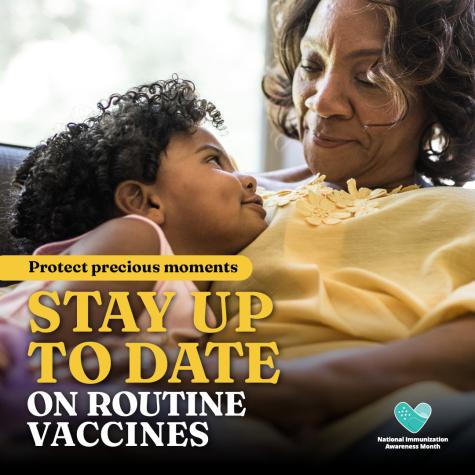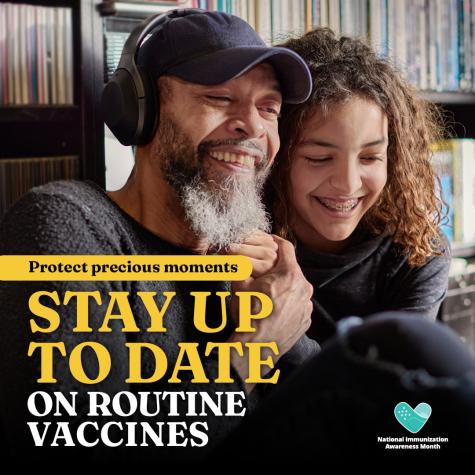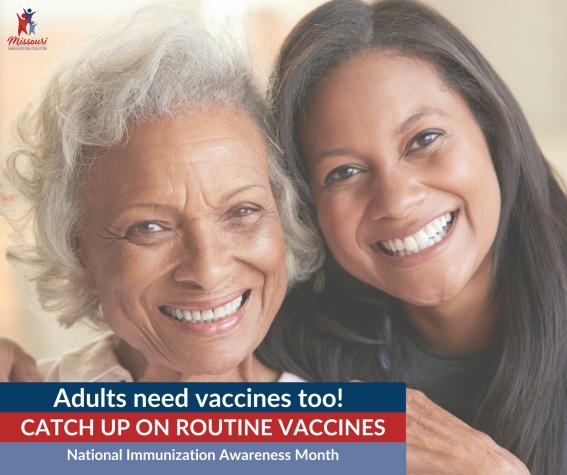Yes. Especially if you are an older adult.
Vaccines are safe and effective tools for preventing the spread of diseases that are shared person to person. The American Association of Immunologists reminds us that each August we celebrate National Immunization Awareness Month to let everyone know which vaccines to get and how often. Some shots are given one time in our lives. Others require boosters or extra doses to make sure we stay protected against that disease. Getting shots not only can help protect your health but also the health of your friends and family. People of all ages get shots. As we age, it is important to stay up to date with our shots because older adults are more likely to get certain illnesses and may develop worse symptoms if sick.
Which types of vaccines should older Missourians receive?
From the time we are born, health care providers offer vaccines for protection against disease. Throughout our lives, doctors recommend various shots for various ages; but which shots do we need as we get older? It is important to talk to your doctor or health care providers to make the best decision for you and your health. The Centers for Disease Control and Prevention recommends the following vaccines for adults 50 and older:
- COVID-19: one or more dose of the updated 2023-24 formula.
- Flu (influenza): one dose each year.
- Respiratory syncytial virus (RSV): for adults 60 and older, one dose. RSV is not a new respiratory illness, but the vaccine was recently approved by the Food and Drug Administration in May 2023 for adults 60 and older.
- Tetanus/diphtheria or tetanus, diphtheria, pertussis (Tdap): one booster dose every 10 years. Helps prevent lockjaw (tetanus), breathing problems (diphtheria) and whooping cough (pertussis).
- Measles, mumps, rubella (MMR): for adults born in 1957 or later, one or two doses as determined by your health care provider.
- Zoster recombinant (shingles): for adults 50 and older, two doses.
- Pneumococcal: Find specific guidance at CDC website, or talk to your health care provider.
- Other shots as recommended by your health care provider: immunize.org Item #P2023.
You may wonder, “If I already got these shots, why do I need them again?” As we age, our immune system can become weaker, which increases the risk of getting seriously ill and could lead to hospitalization or death. The immunity or resistance to disease that we gain from getting shots can also wear off over time. If we live a long time, we may need to get shots again, so we stay protected from diseases that we had protection from in our early years.
Moving forward
Studies show that some people say they do not want to get shots because they do not know what the side effects will be. Others feel they do not have access to shots for a variety of reasons, including lack of health insurance, lack of reliable transportation, unreliable scheduling or not having a primary care doctor. Some people fear needles. Others fear, or do not trust, medical professionals. The Missouri Immunization Coalition is a group that strives to provide accurate information about getting shots with the goal alleviating these fears and obstacles and increasing confidence in the safety and importance of shots. To accomplish this, the Missouri Immunization Coalition works with health care professionals, business leaders, parents and community leaders in the following ways:
- Provide recommendations on getting shots.
- Describe the safety of shots.
- Explain the benefits of shots.
- Encourage staying up to date on shots.
- Support health care professions in sharing shot information with their patients.
As we age, we want to live vibrant, healthy lives. We do not simply want to live to old age. We want to have quality of life and remain independent members of our communities. Talk with your health care provider or physician and ask which shots are right for you. If you aren’t sure about vaccines, it is all right to ask questions. Some questions you can ask your health care provider: Are there side effects with the vaccine? Would this vaccine require a booster? How do vaccines work? Why should I receive a vaccine? Getting vaccinated is one way we can stay healthy and keep the people around us healthy, too.


